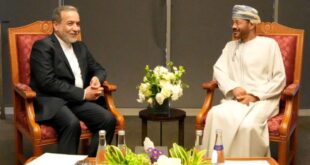Iran’s top nuclear negotiator said Thursday that talks with a senior EU official had brought them closer to “a united view” of how to break a deadlock over Tehran’s nuclear issue. The upbeat comments by Ali Larijani boosted expectations that he and Javier Solana, the European Union’s top foreign policy official, had chipped away at differences over enrichment – a potential pathway to nuclear arms – in two straight days of talks.
“In some areas we are approaching a united view,” Larijani told reporters after a breakfast meeting with Solana and Turkish Foreign Minister Abdullah Gul. “We are aiming to reach out for a common paradigm.”
Solana spoke of a “good meeting,” adding, “We cannot make miracles, but we tried to move … the (nuclear) dossier forward.
“The fact that we are together again is itself a very important development,” he said, alluding to the last time the two men met – in September talks that collapsed over the enrichment issue.
Neither revealed details of their talks. But a government official based in a European capital said the two touched on possible new discussions of what constituted a suspension of enrichment and related activities.
A new definition of an enrichment freeze acceptable to both sides was “the key issue,” said the official, who demanded anonymity in exchange for discussing the confidential information with The Associated Press.
There also was mention of a “double time out” – a simultaneous freeze of such activities in exchange for a commitment not to impose new UN sanctions, said the official, who was briefed on the outcome of the meeting.
The “double time out” concept is supported by International Atomic Energy Agency chief Mohamed ElBaradei and is part of a confidential document shared on Wednesday with the AP.
The one-page document, based on a Swiss initiative, proposes that during such a double-moratorium “Iran will not develop any further its enrichment activities,” and the six powers “will not table any additional UN resolutions and sanctions.”
Diplomats said that the document is opposed by the United States, Britain and France but that parts of it could nonetheless serve as the basis of a later agreement that could lead to formal negotiations.
Solana was meeting with Larijani on behalf of the United States, Russia, China, Britain, France and Germany – the countries at the forefront of international efforts to pressure Iran to make nuclear concessions.
Government officials outside Turkey had told the AP ahead of the meeting that the six powers Solana represented ultimately may be willing to allow Iran to keep some of its uranium enrichment program intact, instead of demanding it be completely dismantled.
That would be a major development: The United States in particular publicly continues to insist that Iran needs to mothball all enrichment and related activities.
Still, the Ankara meetings are only preliminary discussions meant to establish if there is enough common ground for further talks between the two men that could lead to the resumption of formal nuclear negotiations between the six powers and Iran.
Iran’s defiance of a UN Security Council demands on enrichment has led to two sets of sanctions against the country.
Iran argues the sanctions are illegal, noting it has the right to enrich uranium to generate nuclear power under the Nuclear Nonproliferation Treaty (NPT). Iranian officials say nuclear power is the only purpose of their program, dismissing suspicions that they ultimately want weapons-grade uranium for the fissile core of nuclear warheads.
Negotiations broke down last year when the Iranian government refused to suspend enrichment in exchange for a package of economic and political inducements, including help in developing a peaceful nuclear program.
Solana was expected to brief Secretary of State Condoleezza Rice next week, when he attends an EU-US summit in Washington, as well as the foreign ministers of the other five major powers. They, in turn were likely to set ground rules for the next meeting between the two.
 Eurasia Press & News
Eurasia Press & News



